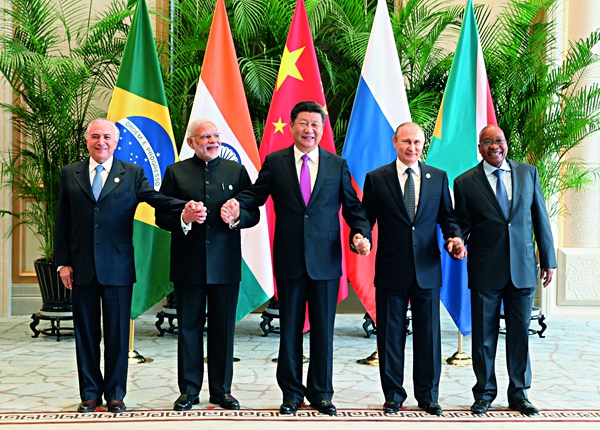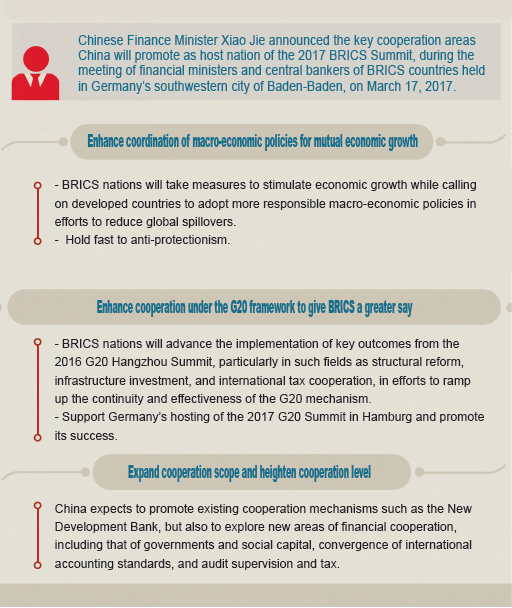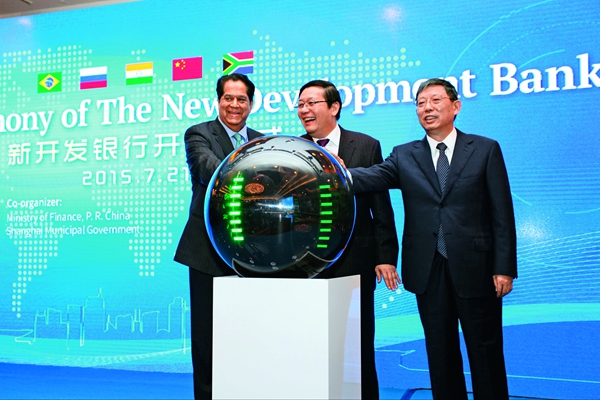BRICS Welcomes Its Second Decade
China Today, June 20, 2017 Adjust font size:
Since the foreign ministers of Brazil, Russia, India, and China (BRIC) first met in September 2006, cooperation among the BRICS nations (later joined by South Africa) has remained strong and has been very fruitful in a number of areas, such as politics, economics, and cultural exchange,” said Wang Xiaolong, special envoy of the Chinese Ministry of Foreign Affairs for BRICS Affairs, in a speech made at the 2017 BRICS Think Tank Symposium on March 22 in Beijing. “The creation and development of the BRICS mechanism conform with the call for a fairer and more just system of global governance, and chime with the common interests of the international community.”

Heads of state from BRICS nations meet in Goa, India on October 16, 2016.
Wang also announced that the 2017 BRICS Summit will be held in September in Xiamen, Fujian Province. As the host country, China will call on all its partners to work together to create a “Stronger Partnership for a Brighter Future” – the slogan for this year’s summit – and to welcome a second decade of cooperation in the light of past experience and a vision of future development.
Reviewing BRICS Achievements
“Formed of an alliance between five emerging nations all with strong momentum and potential, BRICS was originally seen as an investment initiative. Ten years on, the five countries have successfully responded to the expectations of the international community by producing real results,” said Wang Xiaolong. The economic aggregate of the BRICS bloc as a percentage of the world’s total has increased from 12 percent to 23 percent. Wang added that this means the five countries have contributed strong momentum to global development.
The idea of the BRICS alliance was first put forward in 2001 by Jim O’Neill, then chief economist of Goldman Sachs. O’Neil identified four major emerging markets – Russia, China, Brazil and India – and referred to them using the acronym “BRIC.” In 2010, South Africa joined the club, adding an “S” to the term.
According to Wang Xiaolong, the BRICS nations have played a positive part in the advancement of the reform of global economic governance, guaranteeing a multilateral trade system, and giving emerging markets and developing countries a greater say in these aspects. The New Development Bank and the Contingent Reserve Arrangement, created and launched by the BRICS bloc, have also contributed to global economic governance.

Zhao Jinping is director of the Department of Foreign Economic Relations at the Development Research Center of the State Council. He has visited Russia, Brazil, South Africa, and India many times. “I am so impressed with their rich and diverse cultures and the vitality of their social and economic development,” said Zhao. He traveled to New Delhi last November and talked with experts from the National Institution for Transforming India, which reaffirmed his optimistic view of the future cooperation between BRICS countries.
The BRICS nations have always held fast to globalization, as they have benefited from this trend of development, said Zhao. He believes these countries should act collectively rather than independently in order to drive the process forward. “This highlights the importance of cooperation among BRICS countries,” Zhao said, adding that establishing free trade zones (FTZs) or high-level free trade agreements will greatly facilitate economic cooperation between BRICS nations.
Financial Cooperation
“Cooperation between the BRICS countries now extends beyond the economic sphere,” said George Zinoviev, minister counselor of the Russian Embassy to China. He noted that in recent years, at the United Nations and other international platforms, the BRICS nations have successfully coordinated their positions and taken action on a wide range of global issues like terrorism, drugs trafficking and corruption, and have worked to guarantee international information security.
“Moreover, their cooperation in the area of cultural and people-to-people exchanges has also grown rapidly,” said Zinoviev. With this in mind, all parties have called for further cooperation, giving rise to the “BRICS Plus,” a cooperative model named by Chinese Foreign Minister Wang Yi.
Zinoviev particularly stressed the progress that financial cooperation had made under the BRICS mechanism. The New Development Bank has so far confirmed seven investment projects in the five countries. Cooperation within the Contingent Reserve Arrangement has also begun. Zinoviev believes that “the two new mechanisms are able to play a key role in the international monetary system.”

The New Development Bank opens in Shanghai on July 21, 2015.
The 2017 BRICS Think Tank Symposium took the theme of “strengthening financial cooperation and promoting BRICS development.” Luan Jianzhang, secretary general of the China Council for the BRICS Think Tank Cooperation, noted that for emerging markets and developing countries involved in the BRICS mechanism, their voices and level of representation within global economic governance largely correlate with those in the international financial system.
The establishment of the New Development Bank and the Contingent Reserve Arrangement marked the start of BRICS cooperation. Financial cooperation hence became a key aspect of the integral cooperation of the BRICS nations, having been very fruitful. Since 2011, there has been an annual meeting of BRICS financial ministers and central bank governors. According to Wang Xiaolong, the New Development Bank has approved the first batch of projects and issued Green Bonds in China worth RMB 3 billion. The BRICS countries have also acted in concert under international frameworks such as the G20, and have coordinated on a range of issues including reforms of the international financial and monetary system.”
Carlos Henrique Angrisani Santana, special representative of the Brazilian Ambassador to China, believed that the New Development Bank and the Contingent Reserve Arrangement will, to some extent, stimulate reforms at the International Monetary Fund and the World Bank, steering them in the direction of better representing developing countries.
Missions
Over the past few years, Western media has given a lackluster response to the BRICS initiative. What is the future of this mechanism?
Economic globalization is at a turning point. In 2016, world trade grew by 1.7 percent and GDP by 3.1 percent, the lowest since the financial crisis broke out in 2008. In contrast, BRICS’ economies displayed a growing trend – in 2016 India maintained a growth rate of seven percent, and China 6.7 percent; in the other three countries, the falling range gradually diminished and their economies showed signs of bouncing back, although the trend of zero or negative growth has not yet disappeared. All this resulted from a better world economic environment, but also from cooperation among BRICS countries.
Zhao Jinping said increased import demands from China also injected momentum into the economic recovery of BRICS countries and the world as a whole. Taking a look at imports from January to February 2017, the growth rate of imports from India, Brazil, South Africa, and Russia maintained a level higher than that of other countries – India stood at 52 percent, South Africa and Russia were between 41 percent and 43 percent, and Brazil was 39.4 percent.
The Ambassador of South Africa to China, Dolana Msimang, thinks highly of the cooperation between BRICS countries. She said that South Africa is an active participant in the BRICS agenda, and that BRICS countries and emerging markets will play a more decisive role in the reconstruction of the global financial and economic supervision systems.
Regarding the BRICS economy, Luan Jianzhang stressed that the five countries must be confident in themselves, a top priority. In addition, they need to pursue further opening-up, innovation, and cooperation under the BRICS mechanism, while fighting protectionism.
In February 2017, the First BRICS Sherpa Meeting was held in Nanjing, Jiangsu Province. In a speech delivered at the opening ceremony, Chinese State Councilor Yang Jiechi defined the tasks and key points of the preparation work for the BRICS Xiamen Summit.
Communication and cooperation is ongoing in different areas amongst BRICS countries. From March 27 to 29, the Eighth Meeting of Heads of National Statistics of BIRCS Countries was held in Shanghai. On March 31, the BRICS Business Council Midterm Meeting was held in New Delhi, during which China took over the presidency of the BRICS Business Council. On April 6, the Eighth Meeting of BRICS Heads of Intellectual Property Office was held in New Delhi. These meetings will facilitate communication among BRICS countries and improve their cooperation in all areas.